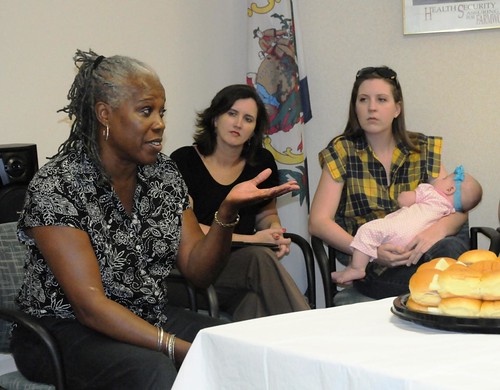
I recently had the pleasure to spend a little time with some expecting and nursing mothers in Martinsburg, West Virginia. It was the first meeting of a newly formed community breastfeeding support group planned to coincide with World Breastfeeding Week. My friend Mitch Greenbaum, Director of Shenandoah Valley WIC and Nutrition Services, and his team of trained WIC nutritionists, board-certified lactation consultants and breastfeeding peer counselors, hosted nearly two dozen pregnant and nursing mothers to talk about how important breastfeeding is for both mother and child and how to have a satisfying and healthy breastfeeding experience.
The women shared stories and got answers to questions new mothers often ask such as: “Does it hurt?” “What should I do when I’m out in public and need to feed my baby?” And, “How can I keep feeding my baby after I return to work?” I shared my personal experiences too; knowing the trepidation and uncertainty a nursing mother experiences. But Mitch’s team of experts calmed the fear and helped the women feel comfortable about the choice to breastfeed. The messages helped the women understand how to cope with a busy schedule and perhaps a job, how to involve family and friends, and most importantly, helped the women understand just how nutritionally important breast milk is.
Research proves that feeding human milk to young children and the practice of breastfeeding improves the health, immune system, and the development of children. It protects against Sudden Infant Death Syndrome (SIDS), ear infections, upper and lower respiratory infections, allergies, intestinal disorders, colds and viruses. Breastfeeding also protects mothers against osteoporosis and breast and ovarian cancer. These nutritional benefits, both for children and for women, last long after breastfeeding has ended.
I applaud local WIC and Nutrition Service programs like the one in Shenandoah Valley for their efforts to promote and encourage this vital part of human development. Through innovative community support groups and local community partnerships; through health provider outreach and public awareness; and through on-line USDA resources such as Loving Support and WIC Works, women, families, and whole communities are more aware of the profound benefits of breastfeeding.





